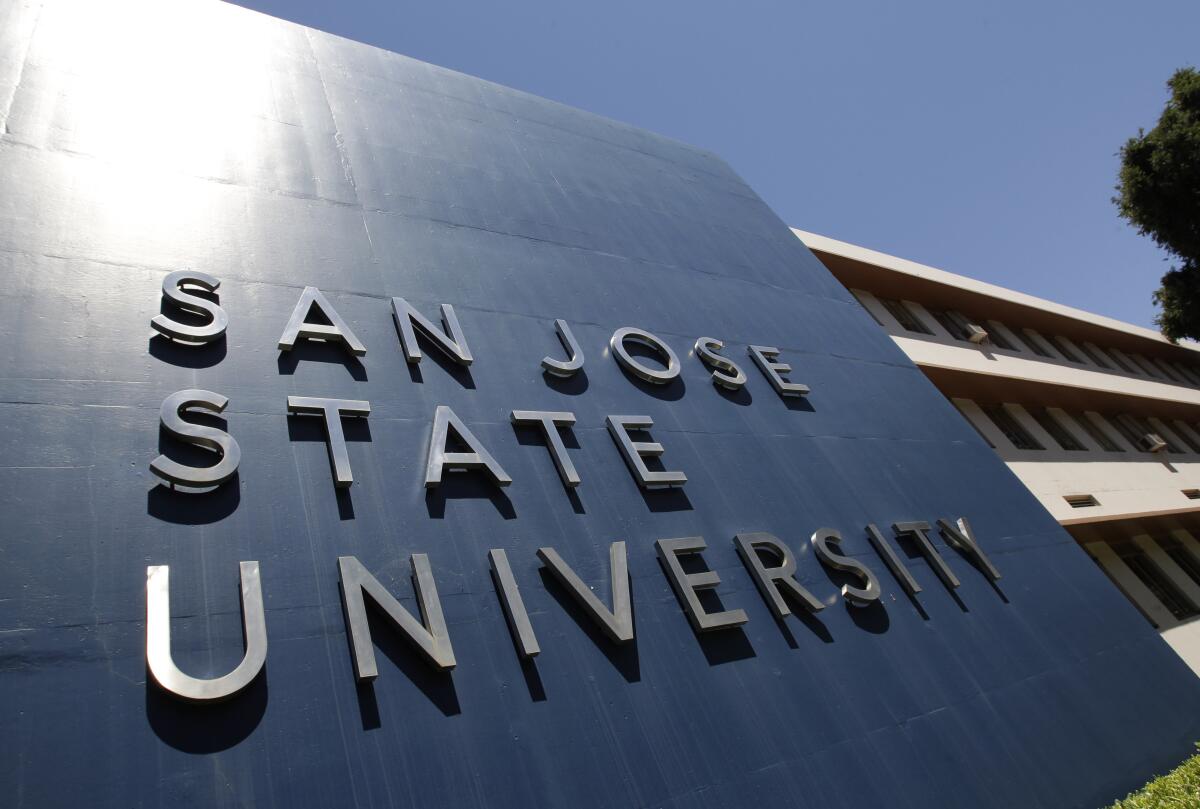How California’s law against red states is hurting Black academic freedom

- Share via
When AB 1887 was passed into law in 2016, its purpose was to name, shame and boycott four states — Tennessee, Kansas, North Carolina and Mississippi — which had passed laws that discriminated against LGBTQ+ persons.
The law bans state-funded and state-sponsored travel to places with discriminatory laws. That list has grown now to 23 banned states. But the measure has failed to curb American prejudice. Commentators have decried the ineffectiveness of such performative politics, noting how even California legislators skirted their own legislation when they’ve traveled to red states.
A side effect of the measure has meant that all scholars at public institutions in California, regardless of their race or the subject matter they study, are prohibited from traveling to the banned states. But this law has specifically harmed Black academics in California, where many of us work at state-funded colleges and universities.
Many Black scholars in California have experienced limitations related to collaborating with fellow scholars and colleagues studying the South, where much of their research is rooted. For example, the administration at San Jose State University told one of us that no funding would be provided to attend the Florida Education Fund’s 2021 McKnight Annual Fellows Meeting, a hallmark event for early career “Black-ademics.”
The law has also hampered scholars who want to interact with their colleagues in the states with discriminatory laws. This kind of policy further divides our country and disconnects Black and LGBTQ+ people from our allies in more conservative regions of the country, while allowing legislators who know little about us to constrain our work.
Most of the states on the AB 1887 banned list are in the South, including Alabama, Texas and Florida. More than 90% of Black Americans lived in Southern states until millions moved out during the Great Migration of the 1910s to 1960s. The vast majority of the first three centuries of Black American history took place in that region. To this day, most Black Americans live in the South. To conduct research and participate in the relevant academic discussions surrounding Black American life, history and culture, the South cannot be off-limits for California scholars, who may want to utilize university funding or public stipends for their research.
Many researchers, known as “Black Infantry Academics,” have taken positions at institutions in the South to do the work from within. Yet, given the bounds of AB 1887, we California-based scholars are financially restricted from working closely with these colleagues.
We have had to forgo attending conferences and panels based in the South, because our state universities would not allow us to use institutional funds to cover our travel. Instead, we must pay for academic conferences this year with our personal funds. It’s not reasonable to expect professors at state schools in California, already one of the country’s most expensive places to live, to pay for important professional research activities out of their own pockets.
As Black California academics, our problem with AB 1887 is its denial of academic freedom, which is ironically the centerpiece of the dispute over Black studies in Florida. Though California sets itself as the legislative antithesis of Florida, AB 1887’s effect upon academics is governmental overreach, not unlike Florida’s so-called anti-woke initiatives.
Florida’s leaders, including presidential candidate Gov. Ron DeSantis, place political grandstanding above the work of scholars and the complexities of marginalized communities.
California legislators have created a strange dichotomy of their own, seeking to protect LGBTQ+ communities while having the effect of limiting the work of those bringing the history of Southern Black communities to light.
Within Black America, Atlanta, not San Francisco nor Los Angeles, is the Black Gay Mecca. Black life and culture cannot be understood through a red state-blue state political lens. Black culture flows in fundamental ways from Georgia to California, Alabama to Arizona. AB 1887 is walling off scholars like us from the majority of Black LGBTQ+ people, who predominantly live in Southern states, the places on the ban list.
But reform may be on its way. The California Legislature is considering a proposal to repeal AB 1887. In April, San Francisco lifted its clampdown on travel and business dealings with states that had anti-LGBTQ laws. State lawmakers should follow suit.
AB 1887 hasn’t protected LGBTQ+ people. Conservative politicians in the banned states have only moved further to the right on these social issues. After seven years, it is very clear that the people it harms are Californians. Let’s stop pretending otherwise and repeal this damaging law.
Keenan Norris is a professor of English and creative writing at San Jose State. A. Lamont Williams is a professor of kinesiology at San Jose State.
More to Read
A cure for the common opinion
Get thought-provoking perspectives with our weekly newsletter.
You may occasionally receive promotional content from the Los Angeles Times.









